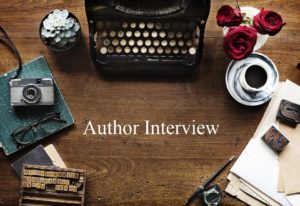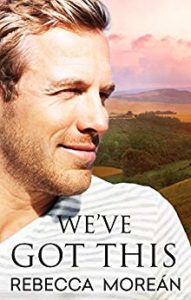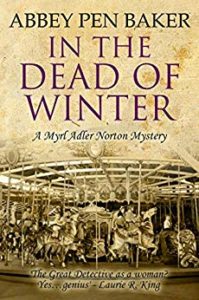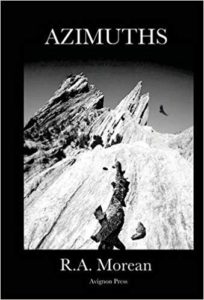An Interview with Rebecca Morean
 Most people in the Dayton writing community have heard or interacted with Rebecca Morean. That’s because she can be found all over the Dayton area. She teaches in the English Department at Sinclair Community College, presents lectures on craft and the business of writing with the Antioch Writers’ Workshop, and coaches writers so they can “find [their] strengths and write to those all the while working on craft.” Despite all the roles she tries to juggle, she’s an active writer, too. Rebecca has published under several names (Rebecca Morean, R. A. Morean, and Abbey Pen Baker), and her work has garnered starred reviews in Kirkus Reviews and Publisher’s Weekly, a Strand International Short Fiction Award, and several SIBA nominations. I’m grateful that Rebecca had some time to sit down and answer my questions.
Most people in the Dayton writing community have heard or interacted with Rebecca Morean. That’s because she can be found all over the Dayton area. She teaches in the English Department at Sinclair Community College, presents lectures on craft and the business of writing with the Antioch Writers’ Workshop, and coaches writers so they can “find [their] strengths and write to those all the while working on craft.” Despite all the roles she tries to juggle, she’s an active writer, too. Rebecca has published under several names (Rebecca Morean, R. A. Morean, and Abbey Pen Baker), and her work has garnered starred reviews in Kirkus Reviews and Publisher’s Weekly, a Strand International Short Fiction Award, and several SIBA nominations. I’m grateful that Rebecca had some time to sit down and answer my questions.
Christina: You truly are a multi-genre author. Are there certain goals you can accomplish with one genre that you cannot with another?
Rebecca: Great question! Not so much goals, but personal interest. I grew up reading Dame Agatha Christie, Sir Arthur Conan Doyle, Nero Wolfe (and the Hardy Boys). I think most story telling is a kind of mystery and there is a puzzle to the plots that is both frustrating and exhilarating when the pieces connect. Christie once said she never decided “who did it” until she was halfway through writing the first draft. Then there’s the characters [Myrl Adler Norton Mystery books]. I became so involved with the idea that (obviously) Sherlock Holmes had a child that I couldn’t let it go. Switching genres, the romances [We’ve Got This, The Bench] are fun to write. I love the audience for romance. They are grateful and loyal and are voracious readers. I also like coming up with characters who are completely relatable and truly seen by their partners. Isn’t that what we all want? Then there’s the literary work that feeds my soul [Azimuths]. There is no other way to put it. It is harder, what I am trying for in each novel or short story often feels unattainable, but I feel compelled to work towards it. So no, it’s not about the goals. I guess its about the fact we are here on this planet for such a short time that I want to spend it writing stories I like to read and with characters I want to be with for awhile.
Christina: When I think of the term “literary citizen,” my mind immediately jumps to you. What is one thing that we can do daily to be better literary citizens?
Rebecca: Support, support, support each other. You are a model literary citizen yourself. Anytime anyone puts fingers on a keyboard or pencil to paper (or mouth to mic), a small miracle is taking place. We should all support that. Buy books, go to readings, create writing communities, share information. There’s not a finite number of readers out there. I have never understood writers who are territorial and selfish.
Christina: You write under multiple names: Rebecca Morean, R.A. Morean, and Abbey Pen Baker. How and why did you decide to do this?
Rebecca: It was mostly by circumstance. I started writing literary short stories and novels under R. A. Morean back when you couldn’t Google someone’s picture. I was so alarmed by the glass ceiling in literary writing, and my books are technically difficult and often built on a concept derived from physics. Alan Lightman could pull it off, but I felt that Rebecca wouldn’t get read by a publisher. So I chose my initials. Abbey Pen Baker is actually a character who is related to Faye Tullis, the “Watson” of the books. She is supposed to be the editor of the now out-of-print books her great aunt “wrote.” Sherlockians love conceits and puzzles, so this fit with the genre. Abbey came from Abbey Grange (canon), Pen is for pen name and Baker, well, that’s probably obvious. Rebecca Morean I chose for the romances just to delineate the audience. I am getting ready to write a more steamy series of romances under another true pen name, mostly because I teach and I don’t want students making assumptions about me from my books!
Christina: As you alluded to, the Dayton area knows of you as both teacher and writer. Did any other professions call to you? And if so, what made you take the path you did?
Rebecca: Teaching is a second career for me. Actually a third. My first is single mother of four. My second was working in nonprofit management in Vermont for a decade, both in international education and community action. When I had my second child, I decided to stay home and take contract work. It wasn’t until I found myself in Ohio and suddenly single with four little kids that I decided to pursue teaching at the college level. That was fifteen years ago. My Master’s with a Creative Writing Emphasis, my publishing background, and the fact I taught a class or two in Vermont as visiting lecturer paved the way for my to do the adjunct shuffle and then land a tenured job at Sinclair. I love teaching. It’s not a job. It’s what I am supposed to do. In that context of mentoring writers, I have begun coaching, which is so gratifying. I also developmentally edit and ghostwrite. In a perfect world I’d probably go back to school and study neuroscience.
Christina: The Abbey Pen Baker books feature Myrl Adler Norton, the daughter of Sherlock Holmes. Where did the inspiration for that character come from?
Rebecca: Jeremy Brett from the Granta series. It was 1993 and I was steeped in the series. “A Scandal in Bohemia” had just aired, and for some reason I was on fire. Holmes was supposed to be an patron of the opera. Why then did he have Watson look Irene Adler up in his files? The only answer I could come up with was that he was trying to appear as if he had no idea who she was. Why would he go to all that trouble? And why did he always refer to her as the woman? And why did he keep her picture? And he clearly rallied to her defense in front of the King. Chivalry. Ah-HA my fevered brain spoke to me–that’s why the entire story is basically related by Holmes to Watson. He is trying to control the narrative because he did know her. In fact, he had slept with her. I was obsessed, and the more I poked around in the story, [and looked at] the clues Doyle had left. I felt he left them for me. And Brett’s performance, such a perfect depiction of Holmes, made the answers to my questions real. Then I had to answer my own questions for my own characters. And that was when the fun really began.
Christina: What is your writing kryptonite?
Rebecca: Fear masquerading as laziness. The best antidote I’ve found besides just placing butt in chair and working is reading Ralph Keyes’s, The Courage to Write. Inspiration comes when I am actually working, or taking long road trips. So it’s easy to be unproductive when my butt is not where it is supposed to be. (I have, by the way, invested in a walking treadmill desk—life changer!) Being unproductive is a killer.



Thanks to Rebecca for agreeing to this interview! If you know of an author who’d like to be featured in an interview (or you are an author who would like to be featured), feel free to leave a comment or email me via my contact page.
